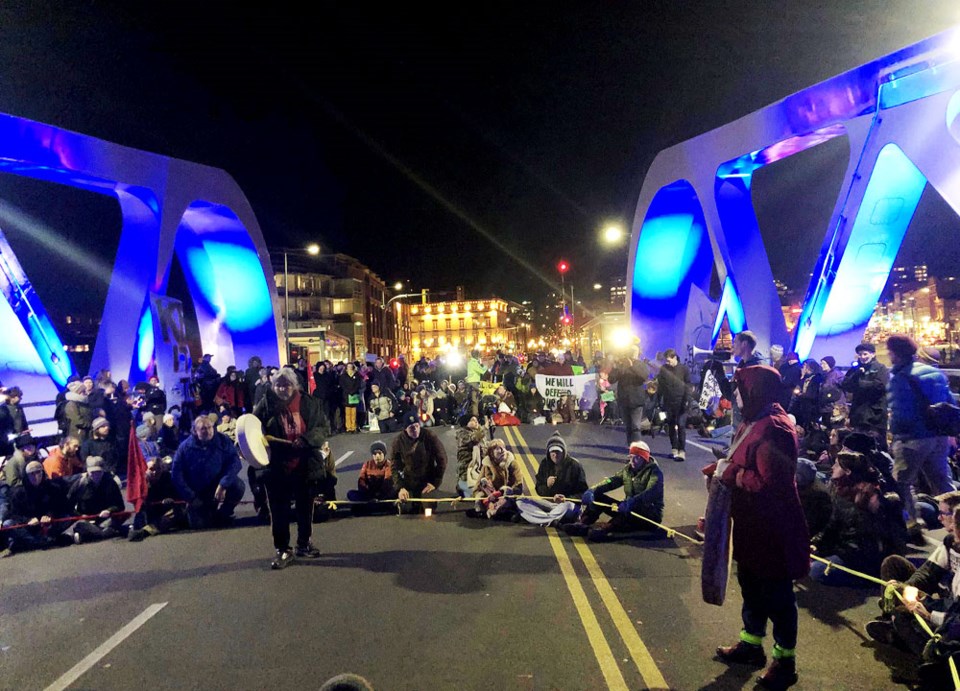Six climate-change protesters were arrested Monday night for refusing to leave the Johnson Street Bridge roadway an hour after most had dispersed from a sit-in that disrupted motor traffic during the evening commute.
Victoria police officers moved in just before 8 p.m. to arrest the six people, who sat cross-legged and linked arms as an officer read them their rights.
Their supporters lined the pedestrian walkway, chanting “climate action is not a crime” and cheering as one by one, the protesters were led into a police van. The arrests were peaceful and methodical and took place after an hour of verbal negotiation with police.
The march, which aimed to highlight government inaction on climate change, was meant to block the bridge for 12 minutes starting at 6:07 p.m. but carried on until 7 p.m. with songs, speeches and chants. Most people started to disperse but Howard Breen announced that he was going to continue sitting on the bridge even though he knew he was risking arrest. Five others joined him.
Organizer Keith Cherry said he accepts that people have a variety of tactics when calling for action on climate change. “I think it’s a great outcome because it shows how serious people are,” Cherry said of the arrests. “These aren’t hardened criminals being arrested, these are seniors and students, office workers and parents. They’re ordinary folk and they feel this strongly.”
About 200 people left Centennial Square around 6 p.m., marching down Pandora toward the Johnson Street Bridge.
Victoria police diverted traffic from Pandora Avenue and stopped cars at Wharf Street from driving onto the bridge. On social media, many expressed frustration at the bridge closing with some saying there are other ways to draw attention to climate change inaction.
Victoria police said earlier they would not close the bridge to facilitate the protesters’ actions.
Gail Meston, a 67-year-old Fairfield resident whose bike was adorned with a sign that read “Pipelines are a dead end,” said she was concerned about the traffic blockade when told about the protest plan.
“We were concerned about disrupting the traffic,” she said. “But we’re also very concerned about climate change and I think more and more it’s being called climate disruption. We need to take note of that and do what we can.”
Amid chilly 5C weather, Meston said it “warms her heart” that that police closed the streets to allow protesters access.
She said she hopes people will understand “and to the ones that don’t, I say ‘we’re sorry.’ ”
Protesters handed out flyers and thanked waiting drivers for their patience.
“When people are asking to weigh the climate change catastrophe that will be facing our children and grandchildren with the fact that drivers might be asked to wait a few minutes on their evening commute, we think it’s a small price to pay,” Cherry said before the march.
During the sit-in, Charles Campbell spoke about the birth of his son, Remy, on Oct. 5, which made him realize “if Remy is to live on a livable planet when he is my age, we have to act now.”
Campbell said he rejoiced when Prime Minister Justin Trudeau declared “Canada is back” at the 2015 climate change summit in Paris, a promise which Campbell said was dashed when the Liberal government spent $4.5 billion to buy the Trans Mountain pipeline from Kinder Morgan.
Marchers carried candles which shone against the blue lights of the bridge. The crowd was hushed for two minutes to reflect on the depth of the climate emergency.
The march was timed to coincide with COP 24, the annual UN climate change conference which started Monday in Poland.
Similar rallies were held across the United Kingdom and Australia last month to highlight government inaction on global climate change. In London, more than 6,000 people blocked five key bridges on Nov. 17, resulting in the arrests of 85 people.



